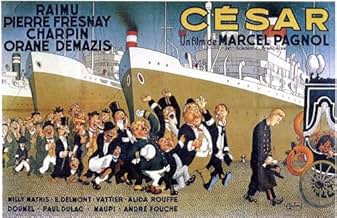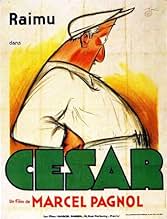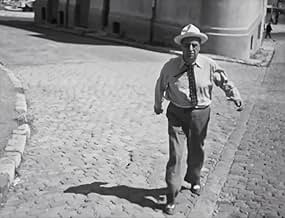Aggiungi una trama nella tua linguaHonoré Panisse is dying, cheerfully, with friends, wife, and son at his side. He confesses to the priest in front of his friends; he insists that the doctor be truthful. But, he cannot bring... Leggi tuttoHonoré Panisse is dying, cheerfully, with friends, wife, and son at his side. He confesses to the priest in front of his friends; he insists that the doctor be truthful. But, he cannot bring himself to tell his son Cesariot that his real father is Marius, the absent son of César,... Leggi tuttoHonoré Panisse is dying, cheerfully, with friends, wife, and son at his side. He confesses to the priest in front of his friends; he insists that the doctor be truthful. But, he cannot bring himself to tell his son Cesariot that his real father is Marius, the absent son of César, Cesariot's godfather. Panisse leaves that to Fanny, the lad's mother. Dissembling that he... Leggi tutto
- Regia
- Sceneggiatura
- Star
- Honoré Panisse
- (as Charpin)
- Innocent Mangiapan
- (as Maupi)
- Le docteur Félicien Venelle
- (as Edouard Delmont)
- Pierre Dromard
- (as Bassac)
Recensioni in evidenza
Still, there's enough room for musings on family, friendship and the sacrifices life demands. The cast is top-notch, with Raimu as brilliant as ever, while Fresnay delivers an electrifying speech towards the end.
Some may find the whole affair too slight, contrived and emotionally charged, but trust me, these three pics are definitely worth six hours of anyone's life... at least, anyone who loves good storytelling.
8 out of 10 hilarious deathbed confessions
'Cesar', the only one of the Marseille trilogy to not be directly based on the play, is the third and final film in the trilogy and a great way to end it. It is not quite as good as my personal favourite 'Marius', but is on the same level as 'Fanny' for generally the same reasons. Despite having occasional story problems, 'Cesar' (named after one of my favourite characters of the trilogy) is the most human, most understated and most moving of the three perhaps and benefits greatly from having Pagnol in the director's chair again and the original cast returning yet again.
It though does have the slightest story of the three films in the trilogy and the only one to feel slightly contrived on occasions. That is my only complaint though.
Like 'Marius' and 'Fanny', 'Cesar' looks lovely and surprisingly evocative. In fact all the great things of those two films are here, for the same and different reasons. Scotto returns as composer and his score is equally as whimsical and charming. Did appreciate that 'Cesar' did have a much better beginning than that of 'Fanny' and that it got to the point much quicker.
There is some nice wit in the writing, the dialogue can be described in the same way as the dialogue in the previous two films. It succeeds in the humorous elements and even more so the emotional moments, balancing both well while having more of the latter. Did love how understated and compassionate the story was.
Which added to the poignancy and humanity of one of the most easy to root for love stories in early talkies. The characters are still compellingly real and their situations are still relatable and relevant now, did find that what happens resonated with me. Pagnol's direction is never too static or theatrical, he stays true to his roots while opening up the drama enough so it does feel cinematic.
Fanny is slightly underdeveloped again, but again that is namely down to the deeper characterisations of the other characters. Especially Cesar. The acting is great again, especially Raimu giving perhaps his best performance of the trilogy and he was astounding in 'Marius' and 'Fanny' as well.
Concluding, great and a more than worthy end to a wonderful trilogy of films. 9/10
While I loved MARIUS (1931) and Fanny (1932), I found myself falling asleep repeatedly while watching César. Again and again and again, I found myself dozing. At first, I thought I was just tired, but when I stopped the DVD each time I felt wide awake. I think in hindsight my reaction was because after the first few minutes of this movie, the trilogy, for me, was finished. In other words, the story was as complete as it should be and continuing it seemed superfluous. The 1961 Fanny film ended there, but continuing was probably, in hindsight, not the best decision. I honestly feel that the average viewer could see MARIUS and FANNY without having to see César. It just didn't seem necessary or compelling.
As far as performances and writing go, Raimu, who played Marius' father, was a marvelous actor and was excellent in all three movies. He was also fantastic in Pagnol's film La FEMME DU BOULANGER. An amazing talent. Also, Pagnol has written some amazing films apart from this series--try to see them all. It's just that of all of his work and the books I have read by him, my least favorite is César.
The port is still (albeit much less so) a smuggler's paradise, and the social life of the city is still centred around good food, good love, and strong drink. Pagnol and Raimu knew the city well, and gave it the starring role in the trilogy. Imagine their joy at being able to relocate a stage play to the Mediterranean coast and use genuine atmospheric exteriors of the old port in all its pre-war glory. The city, and particularly the docks, took a real beating from both sides in WW2, so Pagnol not only created a few masterpieces of cinema, but also an invaluable document of a lost architecture and layout.
The nonsense between L'Academie and Pagnol was related to the prevailing Parisian view of southerners as being crude, unsophisticated people who lived a simple life of manual labour, procreation, drinking and eating (cul terreux). The view from the south that still prevails, is one of a Paris riddled with snobbish elites (peigne cul) totally divorced from the realities of healthy living . The wonderful climate and diet of the Mediterranean coast has long been a source of envy for those condemned by fate to dwell in the damp root vegetable fogs of northern France. Pagnol was gleefully rubbing their noses in it.
Pagnol opened up a lot of avenues in film, but the people of Marseilles remember him mostly for his authentic capturing of la vie quotidienne. I'll drink to that.
Lo sapevi?
- QuizOdette Roger is credited in the opening credits as "la bonne de l'hotel" (the hotel maid) but does not appear in the film. The hotel sequence was cut out of the final print.
- Citazioni
Honoré Panisse: One can't live without doing wrong.
- ConnessioniFeatured in Les sentiers Marcel Pagnol. Les chemins d'une vie (2005)
I più visti
Dettagli
Botteghino
- Lordo Stati Uniti e Canada
- 8262 USD
- Fine settimana di apertura Stati Uniti e Canada
- 7720 USD
- 8 gen 2017
- Lordo in tutto il mondo
- 8262 USD
- Tempo di esecuzione2 ore 48 minuti
- Colore
- Mix di suoni
- Proporzioni
- 1.37 : 1
Contribuisci a questa pagina































